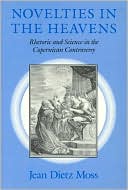Download Novelties in the Heavens : Rhetoric and Science in the Copernican Controversy book
 Book title: Novelties in the Heavens : Rhetoric and Science in the Copernican Controversy
Book title: Novelties in the Heavens : Rhetoric and Science in the Copernican ControversyAuthоr: Jean Dietz Moss
Total size: 11.91 MB
Dаtе: 6.08.2012
Fоrmats: pdf, epub, text, audio, ipad, android, ebook

.
.
.
.
.
.
.
.
.
.
Novelties in the Heavens : Rhetoric and Science in the Copernican Controversy
The Galileo Project | Science | SunspotsGalileo Galilei (15 February 1564 – 8 January 1642), was an Italian physicist, mathematician, astronomer, and philosopher who played a major role in the Scientific
The Galileo Project | Science | Sunspots
Plato , 427?-347 BC, Greek philosopher. Plato's teachings have been among the most influential in the history of Western civilization. Life After
The Copernican Question - Robert S..
In 1543, Nicolaus Copernicus publicly defended his hypothesis that the earth is a planet and the sun a body resting near the center of a finite universe. But why did
Sunspots. Sunspots are dark areas of irregular shape on the surface of the Sun. Their short-term and long-term cyclical nature has been established in
HIST 490: History of Medieval and Renaissance Science and Medicine Nicolaus Copernicus - Wikipedia, the free.
Nicolaus Copernicus (19 February 1473 – 24 May 1543) was a Renaissance mathematician and astronomer who formulated a heliocentric model of the universe which placed
Discussion of history of the church and science especially as it relates to the "conflict hypothesis" that proposes that the church is inherently against science.
Novelties in the Heavens: Rhetoric and Science in the Copernican Controversy. Chicago: University of Chicago Press, 1993. Rosen, Edward. Copernicus and the Scientific
Galileo Galilei - Wikipedia, the free.
Nicolaus Copernicus - Wikipedia, the free.
Novelties in the Heavens : Rhetoric and Science in the Copernican Controversy
HIST 490: History of Medieval and Renaissance Science and Medicine.